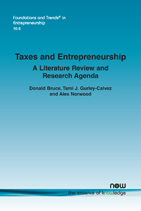Taxes and Entrepreneurship: A Literature Review and Research Agenda
By Donald Bruce, Boyd Center for Business and Economic Research and Department of Economics, University of Tennessee, USA, dbruce@utk.edu | Tami J. Gurley-Calvez, Department of Health Policy and Management, University of Kansas Medical Center, USA, tgurley-calvez@kumc.edu | Alex Norwood, Boyd Center for Business and Economic Research, University of Tennessee, USA, anorwoo1@utk.edu
Abstract
The potential impacts of tax policies on entrepreneurial activity have attracted the attention of researchers and policy makers for several decades. Entrepreneurship and innovation are critical elements of the macroeconomy and small businesses contribute significantly to employment and economic growth. Recognizing this, policy makers have a long history of attempting to encourage small business activity through a variety of attractive tax policies. The effectiveness of these policies hinges critically on the extent to which entrepreneurs actually respond to taxes. The theoretical literature has recognized that taxing the returns to risky activity can actually increase risk-taking, especially in the presence of progressive marginal tax rates and loss offset provisions (Domar and Musgrave, 1944). The empirical literature has been inconclusive, with some studies finding a positive relationship between tax rates and small business activity, others finding a negative relationship, and still others finding no significant relationship at all. In this monograph, we review the existing empirical literature in this area and lay out an agenda for future research. We discuss the many ways in which researchers have measured entrepreneurship and small business activity, as well as the variety of tax rates and other policies that have been explored in prior studies.
Taxes and Entrepreneurship: A Literature Review and Research Agenda
Taxes and Entrepreneurship reviews the existing empirical literature on the impacts of tax policies on entrepreneurial activity and presents an agenda for future research. The authors first discuss the many ways in which researchers have measured entrepreneurship and small business activity. They explore the various strengths and weaknesses of measures of stocks versus flows, individual versus aggregate analyses, survey versus administrative data, and extensive versus intensive margin indicators of entrepreneurship. The monograph then discusses the various tax rates and other tax policies that have been considered in the literature, again considering their advantages and disadvantages. Next, a few of the major empirical issues facing research on taxes and entrepreneurship are reviewed including the possible endogeneity or simultaneity of tax rates, the importance of timing issues, and the latest econometric attempts to account for pre-existing trends in entrepreneurship and tax data.
The authors present an exhaustive and inclusive summary of the large and growing empirical literature on taxes and entrepreneurship. In an effort to enhance the usefulness of the monograph, the literature is segmented into U.S. federal studies, U.S. state and local studies, and international studies. It is further subdivided into time series, cross-sectional, and longitudinal analyses. The literature review provides a synthesis of findings spanning all of the above categories and focusing on what are the most conclusive studies in each area. The monograph concludes with a discussion of future avenues for empirical research in this area based on the identified gaps in the existing literature.
